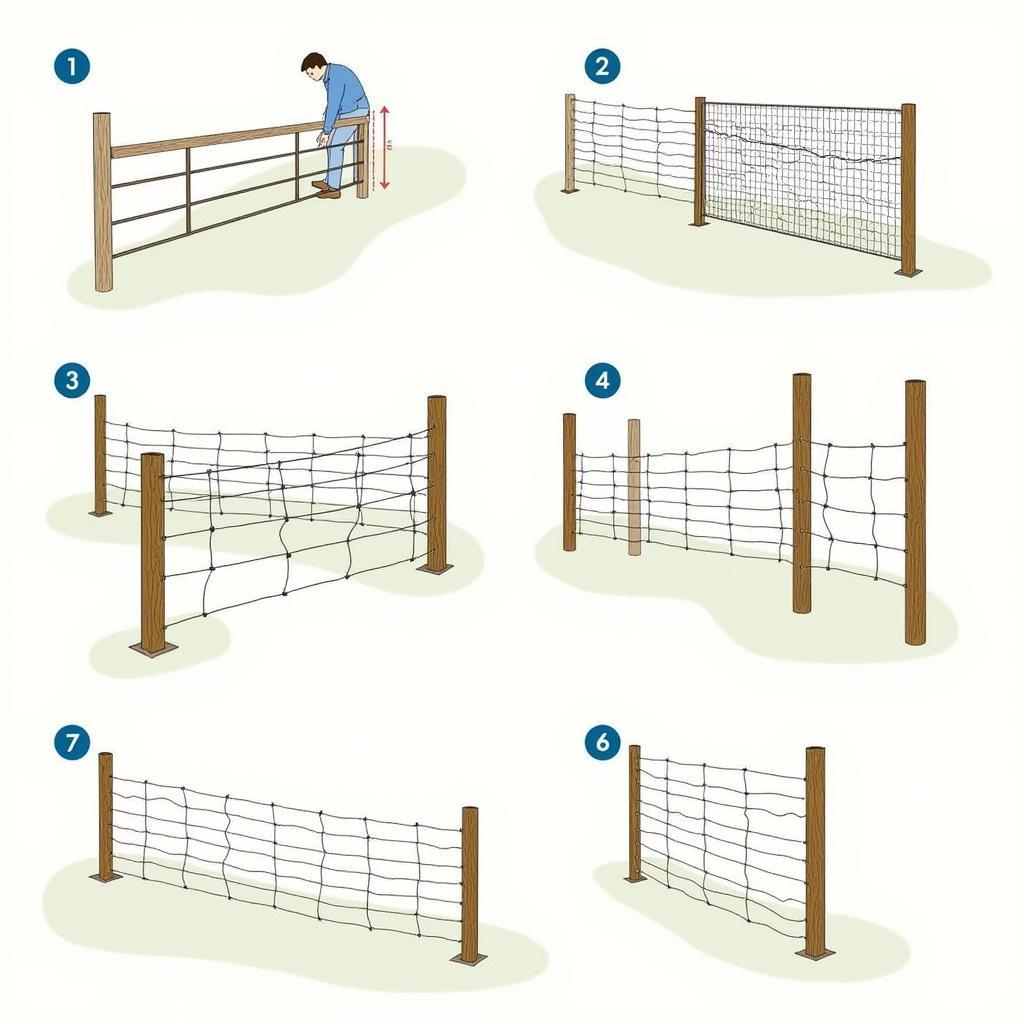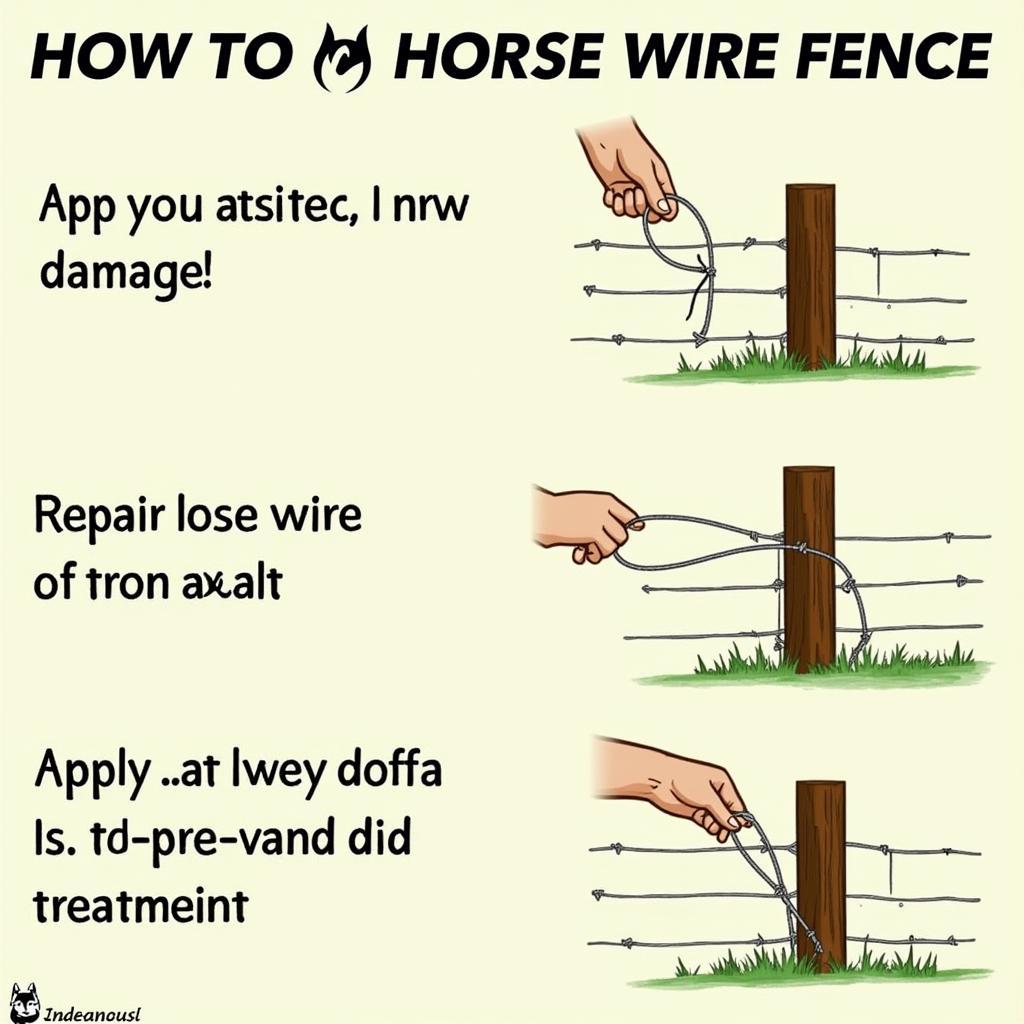Selecting the right fencing is crucial for ensuring your horse’s safety and well-being. With numerous options available, choosing the optimal Horse Wire Fence Roll for your specific needs can seem daunting. This guide explores the essential factors to consider when purchasing horse wire fence, empowering you to make an informed decision that prioritizes your equine companion’s safety and security.
Factors to Consider When Choosing a Horse Wire Fence Roll
Before diving into the specifics of horse wire fence rolls, let’s examine the key factors influencing your decision:
- Visibility: Horses have poor depth perception, necessitating highly visible fencing to prevent accidents.
- Strength and Durability: Your fence should withstand the weight and force of a horse leaning or pushing against it.
- Height: A minimum height of 4.5-5 feet effectively deters most horses from attempting to jump or escape.
- Spacing: Narrow spacing between wires, especially at the bottom, prevents horses from getting their legs caught.
- Material: Choose materials that are safe, durable, and resistant to rust and weather damage.
- Budget: Determine a realistic budget and explore options that align with your financial constraints.
Types of Horse Wire Fence Rolls
 Installing Horse Wire Fence
Installing Horse Wire Fence
Several types of horse wire fence rolls cater to diverse needs and preferences. Let’s delve into the most popular options:
Woven Wire Fence
Woven wire fence, also known as mesh wire fence, is a widely used option for horse enclosures. This type of fence comprises horizontal and vertical wires interwoven to create a sturdy, interconnected barrier. The woven design provides strength and stability while preventing horses from putting their hooves or heads through the gaps.
Pros:
- Highly visible and easily noticeable by horses
- Provides excellent containment due to its woven structure
- Relatively affordable compared to other options
Cons:
- Susceptible to rust if not galvanized or coated
- Can be less durable than high-tensile wire
High-Tensile Wire Fence
High-tensile wire fence is a robust option known for its exceptional strength and durability. It utilizes high-strength steel wires that are tightly stretched between posts, creating a secure boundary. This type of fence effectively resists pressure and impact, making it suitable for containing even the most determined horses.
Pros:
- Extremely strong and durable, able to withstand significant force
- Requires fewer posts than woven wire, potentially reducing installation costs
- Offers excellent longevity
Cons:
- Less visible to horses, increasing the risk of accidents if not properly marked
- Requires specialized tools for installation and tensioning
Vinyl-Coated Wire Fence
Vinyl-coated wire fence combines the strength of wire fencing with the added protection of a durable vinyl coating. The vinyl layer enhances visibility, protects the wire from rust and corrosion, and provides a smoother, safer surface for horses.
Pros:
- Highly visible and aesthetically pleasing
- Resistant to rust, corrosion, and UV damage
- Provides a safer surface, minimizing the risk of injuries
Cons:
- Can be more expensive than other options
- The vinyl coating may be susceptible to cracking or peeling over time
Installation Tips for Horse Wire Fence Rolls
 Maintaining Horse Wire Fence
Maintaining Horse Wire Fence
Proper installation is paramount for ensuring the safety and effectiveness of your horse wire fence. Here are some essential tips to keep in mind:
- Use sturdy posts: Opt for pressure-treated wood or metal posts that can withstand the weight and force of your fence.
- Set posts deep enough: Ensure posts are buried at least 3 feet deep to provide adequate stability.
- Stretch the wire tightly: Loose wires can sag and create hazards for your horses.
- Use proper bracing: Bracing at corners and gates adds crucial support and prevents the fence from leaning or collapsing.
- Install a top rail: A top rail enhances visibility and provides additional structural integrity.
Conclusion
Choosing the best horse wire fence roll is a significant decision for any horse owner. By carefully considering the factors discussed above and exploring the various options available, you can create a safe, secure, and comfortable environment for your equine companions. Remember to prioritize visibility, strength, and durability when making your selection.
For more information on creating a horse-friendly environment, check out our articles on round pens horses and wire fence for horses.
FAQs
What is the best type of horse wire fence?
The best type of horse wire fence depends on your specific needs and preferences. Woven wire is a good all-around option, high-tensile wire offers exceptional strength, and vinyl-coated wire provides enhanced safety and aesthetics.
How much does horse wire fence cost?
The cost of horse wire fence varies depending on the type, height, and length of the fence, as well as the materials used.
Can I install horse wire fence myself?
While it is possible to install horse wire fence yourself, it can be a challenging and time-consuming task. If you are not experienced in fence installation, it is recommended to hire a professional.
How do I maintain my horse wire fence?
Regularly inspect your fence for damage, repair loose wires or posts promptly, and apply rust-preventive treatments to metal components.
For additional guidance on creating a harmonious space for your horse and other furry friends, explore our insights on horse and a dog. If you’re considering Oregon horse properties, we can provide valuable resources and information.
Still have questions? Contact us! Our dedicated team is available 24/7 to provide expert advice and address any concerns you may have. Reach us at Phone Number: 0772127271, Email: [email protected], or visit our location at QGM2+WX2, Vị Trung, Vị Thuỷ, Hậu Giang, Việt Nam.